The Price of Citizenship: Why More US Expats Are Eyeing the Exit

What would it take for you to give up your citizenship? For a growing number of Americans living abroad, that question isn’t hypothetical—it’s becoming a serious consideration. As US expats weigh the trade-offs of holding on to their citizenship, many say the emotional, financial, and political costs are mounting.
In the 2025 Expat Trends Survey, the Greenback team asked over 1,100 Americans (including 719 US expats) about their views on citizenship, representation, taxes, and life abroad. The findings offer a deeper look at what’s driving expats to reconsider their ties to the US and what life looks like after they leave.
Key Takeaways
- A large majority of expats (83%) said US tax filing requirements are stressful.
- 49% of US expats plan to or are seriously considering renouncing their US citizenship.
- From 2024 to 2025, the share of expats considering renunciation jumped 63%, from 30% to 49%.
- 55% of expats don’t know the IRS offers a program—Streamlined Filing Procedures—to help delinquent filers catch up without penalties.
- Over a third of Americans surveyed are considering a move abroad, with top motivators including cost of living, travel, safety, and lifestyle upgrades.
- 63% of expats said the 2024 election outcome reinforced their decision to stay abroad.
Renouncing US Citizenship
Feelings of frustration and disconnection from the United States appear to be intensifying for Americans abroad. Our research took a closer look at which groups are most likely to consider renouncing their US citizenship and why.
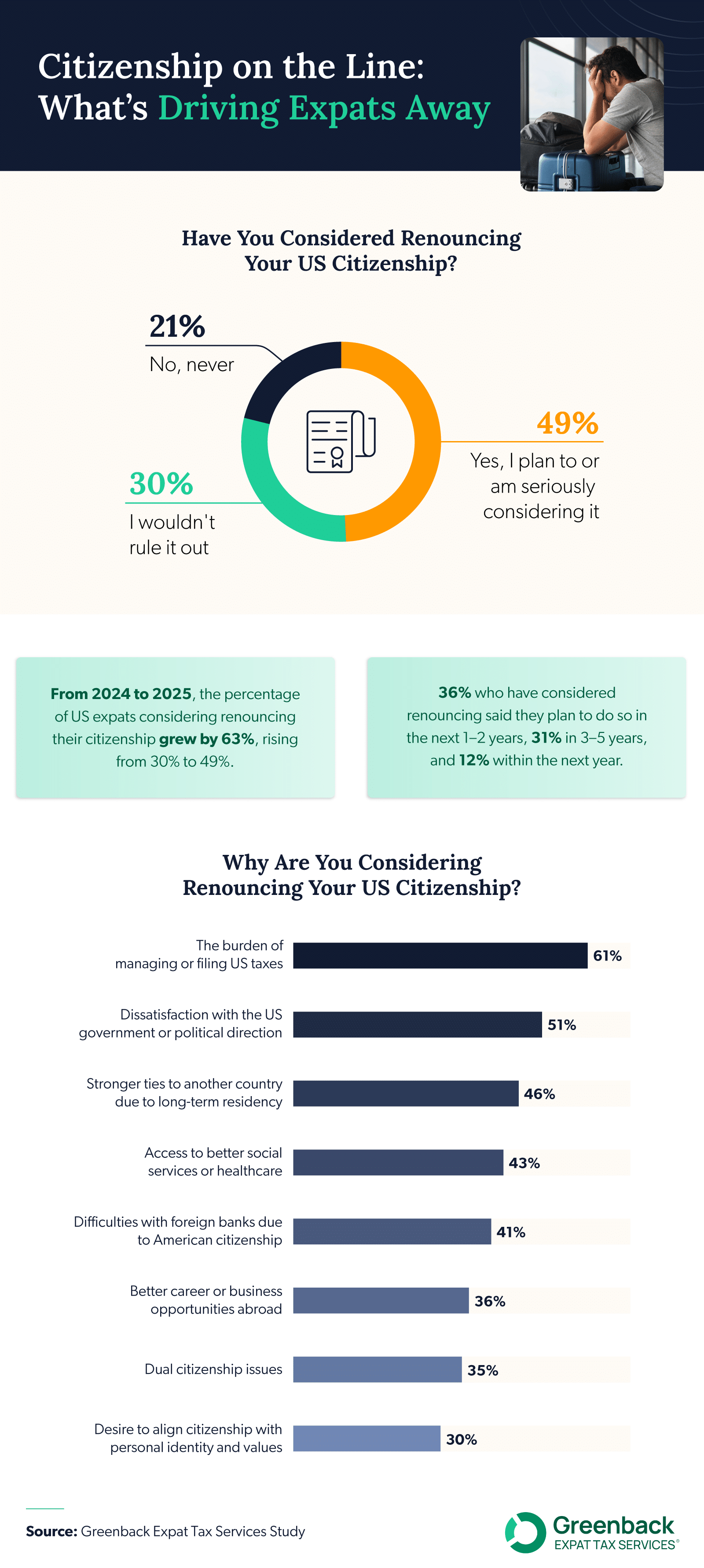
Nearly half of US expats (49%) said they either plan to or are seriously thinking about renouncing their citizenship. That marks a significant 63% rise since last year, when just 30% reported the same. A key driver of this change? Politics. More than half of those considering renunciation cited dissatisfaction with the direction of the US government as a top reason.
Millennial and Gen X expats were the most likely to consider giving up their citizenship, at 60% and 54%, respectively. Both Gen Z and baby boomers reported much lower levels of interest, each at 29%. Parents were also more likely to take this step: 71% of expat parents with children under 18 had considered renunciation, compared to just 31% of those without kids.
Location mattered, too. Expats living in India showed the highest levels of interest in renunciation (93%), followed by those in the UK (53%), France (48%), Australia (47%), Canada (30%), and Germany (27%). Only 12% of expats in Spain reported the same.
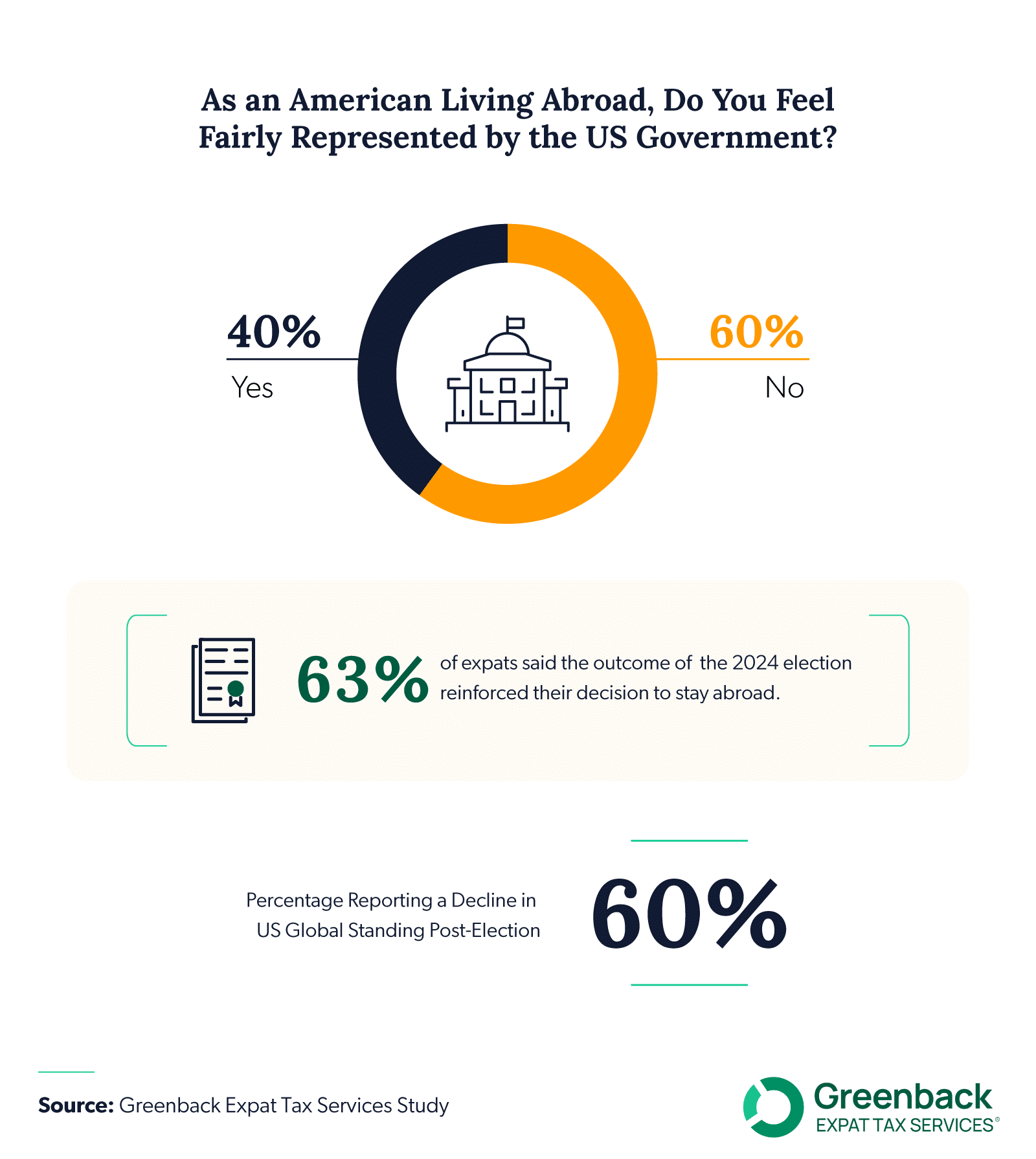
Following the 2024 election, 63% of expats said the results confirmed their decision to remain abroad. A majority also felt the US had lost ground globally, with 60% believing America’s international reputation declined after the election. More than half (54%) said US foreign policy toward their host country had worsened, while just 31% saw any improvement.
Three in five expats also shared that they don’t feel fairly represented by the US government. These combined factors suggest that many Americans living overseas are increasingly disillusioned, not just with domestic politics, but with how the country is perceived and engaged with around the world.
Filing From Abroad
Filing taxes from overseas presents a unique set of challenges that many Americans back home never have to consider. We’ll now explore how confident expats feel about their US tax responsibilities and what’s making the process so difficult.
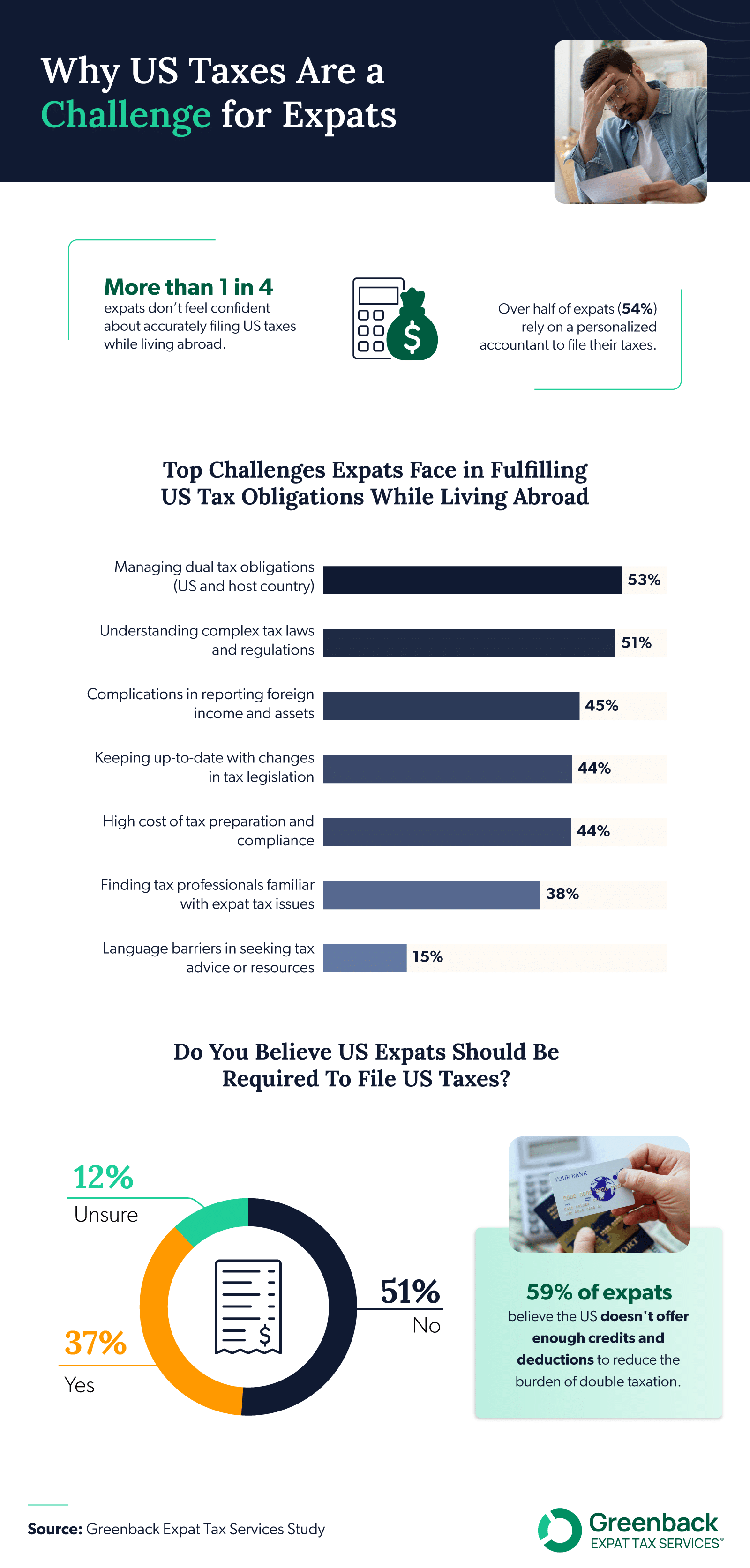
More than 1 in 4 expats said they don’t feel confident about correctly filing US taxes while living abroad. That uncertainty is understandable, given the specific pain points they cited. The most common challenge? Managing dual tax obligations between the US and their host country, which 53% flagged as a top issue.
Another 51% pointed to the difficulty of understanding complex tax laws and regulations. And 45% said reporting foreign income and assets added further complications. These numbers highlight the need for more accessible, expert-driven support for expats navigating complex systems in multiple countries.
Tax Laws Abroad
Financial compliance can be one of the most overwhelming parts of living abroad as a US citizen. Here’s how expats are handling foreign banking laws and tax pressures, and whether they’re even aware of potential relief on the horizon.
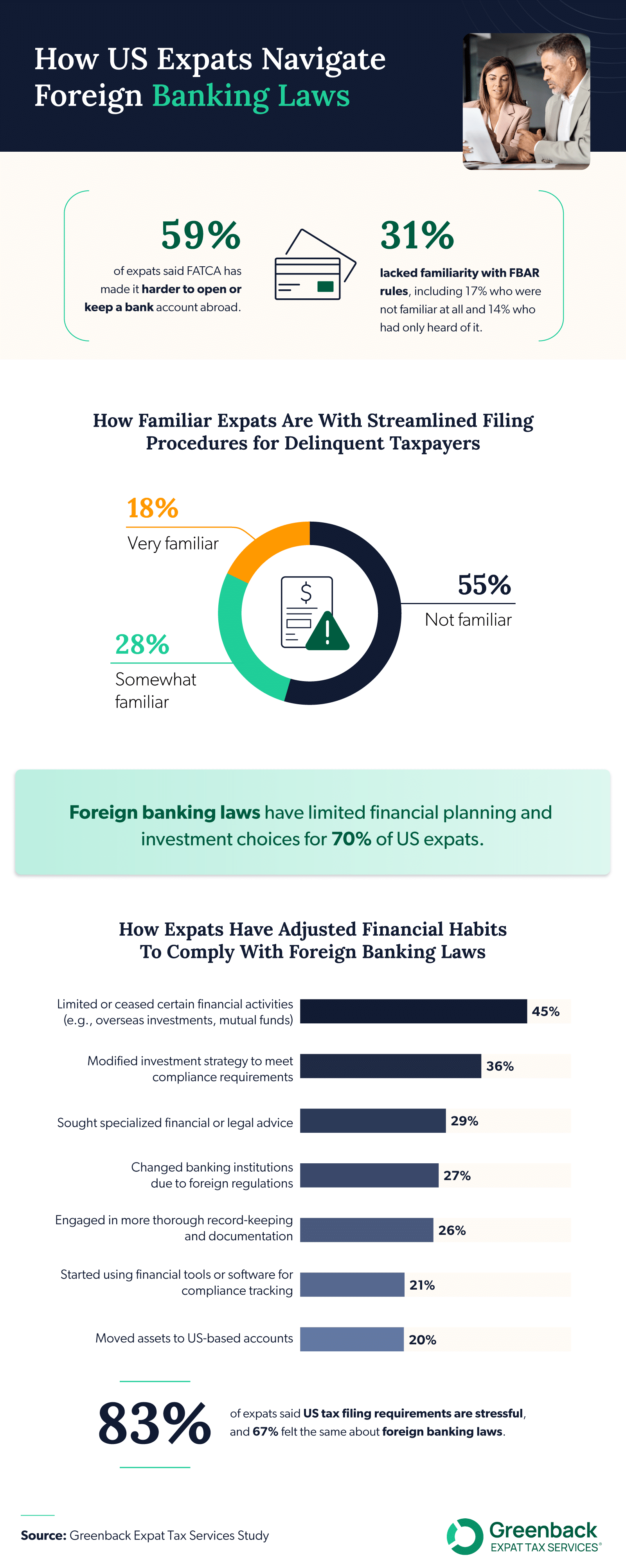
A large majority of expats (83%) said US tax filing requirements are stressful. Two-thirds (67%) also found foreign banking laws to be a source of stress. One law in particular, FATCA, continues to complicate life abroad. Nearly 6 in 10 expats said it has made it more difficult to open or maintain a bank account in their country of residence.
Life After Leaving the US
What motivates someone to move abroad, and what keeps them there? These are the personal and financial factors shaping expat life, plus what draws new groups to consider the same path.
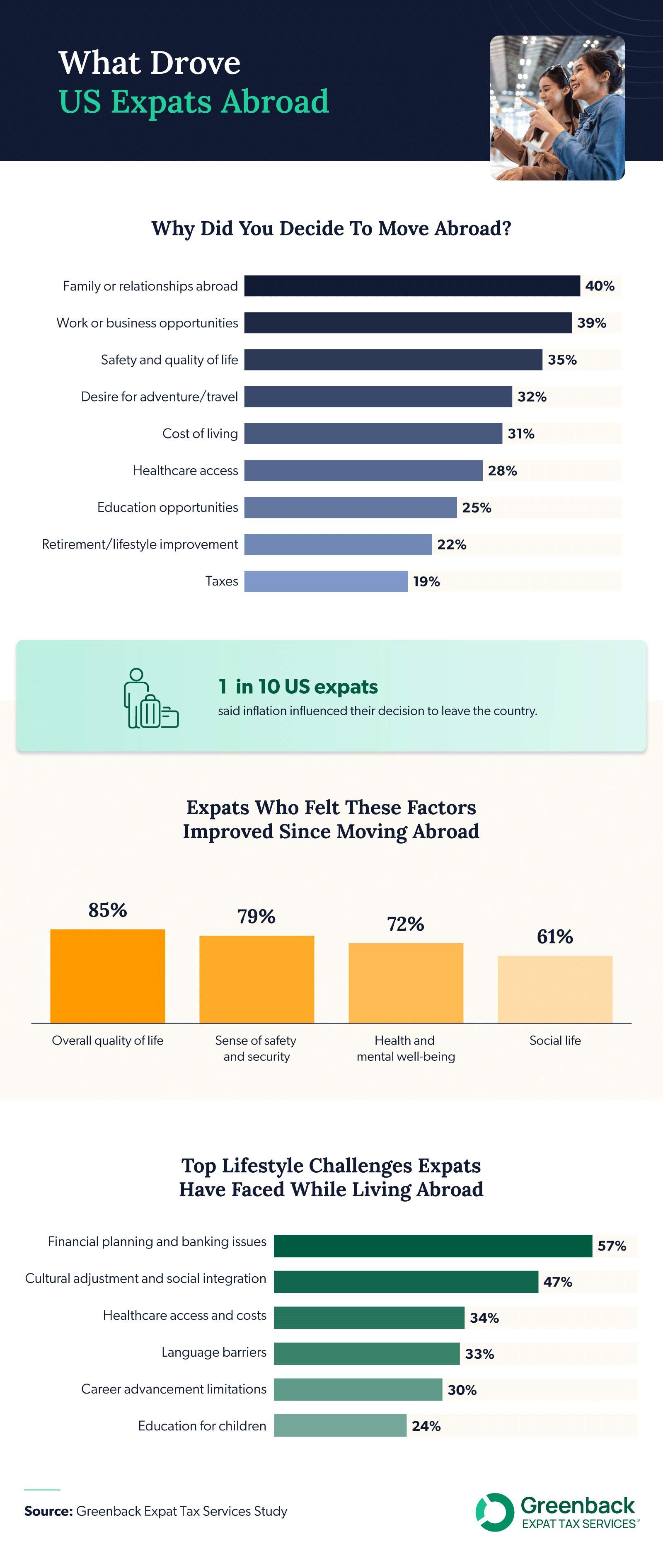
For 1 in 10 US expats, inflation played a direct role in their decision to leave the country. Despite leaving the US behind, most expats stay connected, with 63% traveling back at least once a year. When it comes to building community in their new homes, most found it through local friends or colleagues (75%), followed by family abroad (45%) and expat social groups (34%).
When it comes to financial planning issues, 67% of expats said managing both US and foreign tax obligations is their top challenge. Others pointed to retirement planning (45%), currency fluctuations (40%), and finding reliable expat financial advisors (37%) as ongoing hurdles. Meanwhile, interest in living abroad continues to grow.
We also surveyed the general US population to explore their thoughts about becoming expats. Of them, 35% said they are thinking about moving overseas, and 16% said they plan to do so within the next year.
Their biggest motivators included a lower cost of living and a desire for travel (48% each), safety and quality of life (46%), and retirement or lifestyle upgrades (37%). They also cited healthcare access (34%), the outcome of the 2024 election (33%), work or business opportunities (21%), and inflation (20%).
Reconsidering Roots: What Expats Are Telling Us
This year’s data paints a clear picture: A growing number of US expats feel disconnected from the government, burdened by tax complexities, and uncertain about the benefits of maintaining US citizenship. Nearly half are seriously considering renouncing their citizenship, with many citing political dissatisfaction and financial pressures as key reasons. As more Americans explore life overseas, the question may no longer be whether to leave but whether to keep their US passports.
Methodology
We surveyed 1,145 Americans to explore their sentiments about living abroad and their views on citizenship, taxes, and foreign banking. Among them, 719 were current American expats living abroad, and 426 belonged to the general population. Among US expats, the generational breakdown was as follows:
- Gen Z: 13%
- Millennials: 51%
- Gen X: 18%
- Baby Boomers: 17%
The data was collected from Feb. 19 to Mar. 20, 2025. Due to rounding, percentages in this study may not total 100% exactly.
About Greenback Expat Tax Services
Greenback Expat Tax Services is your trusted partner in navigating the complexities of US taxes while living overseas. We provide expert guidance, tailored solutions, and a seamless digital experience to help expatriates stay compliant with ease.
Fair Use Statement
Sharing this content for noncommercial purposes is welcome if a link back to the article is given.
Who doesn’t love a tax break? Download our easy-to-use excel calculator to get an estimate of how the foreign earned income exclusion can save you money.
